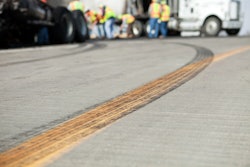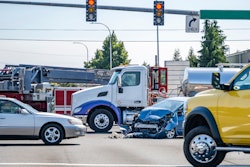Oral arguments began Tuesday in a 2014 crash case that the entire industry is watching closely, as the outcome will likely help establish future liabilities for carriers involved in crashes where their sheer involvement in a collision, regardless of fault, exposes them to some form of responsibility.
In the case before the Texas Supreme Court this week, a pickup driven by Zaragoza Salinas crossed a median, traveling upwards of 60 mph, and struck a Werner Enterprises (CCJ Top 250, No. 14) truck traveling in the opposite direction. Attorneys for Werner have asked the Texas Supreme Court to void a $100 million judgement against the company.
Defense attorney Thomas Wright argued Tuesday that the court of appeals "deviated" from previous rulings to hold Werner responsible for a crash that killed Zachery Blake, 7, and injured Brianna Blake, 12, Nathan Blake, 14, and their mother Jennifer Blake, and "for the first time has held that a driver in his own lane, under control of his vehicle, is liable when somebody on the opposite side of an interstate highway loses control, spins out, crosses over a 30-foot median – plus the shoulders – and runs in to the driver in his own lane with no time to react."
Not fault, but duty
Werner has maintained for a decade that its driver, Shiraz Ali, bore no blame in a crash that he could not have avoided. Yet a Houston jury in 2018 found Werner liable for the crash, awarding the family of the victims a nine-figure sum. Attorneys for the plaintiffs in that case argued the driver, Ali, should have pulled off of Interstate 20 due to the icy conditions, and blamed Werner for not instructing Ali to avoid the highway due to poor driving conditions.
A Texas court of appeals in 2023 affirmed the more than $100 million verdict.
Justice Jane Bland Tuesday questioned if it was reasonably foreseeable that, given the icy weather conditions, a car could possibly leave its lane of travel and spark a crash. Given that is a possible outcome, plaintiffs' attorneys argue, Ali had a duty to the family that hit him.
"It's certainly foreseeable that somebody in the next lane could come into your lane," replied Werner attorney Thomas Wright, "but you cannot realistically travel down the highway in any kind of weather if you have to anticipate that somebody might, without warning, leave the interstate lane 30 feet across. I mean, that's why they built the interstate highway system, to keep these cars separated, and spin out and come into your lane with less than two seconds for you to react..."
Plaintiff attorney Darrin Walker argued that Ali's speed, roughly 50 mph and below the posted limit, was too fast for the weather conditions and, "because Ali could have avoided the collision had be been going a reasonable speed, at that point of notice," which Walker said was 15 mph, "his speed was a proximate cause."
Proximate cause refers to the direct and legally sufficient cause of an injury or harm, or the event that is considered the primary reason for an accident or damage, and Walker contended that Ali's inability to avoid the collision was directly responsible for the fatal crash and breached his duty of care for other motorists on the road.
Wright argued that the only motorists to which Ali owed a legal duty of reasonable care were those in his own lane of travel, noting accidents of this type can happen in any type of weather or as the result of a tire blow out.
"So if you have to continually anticipate that... if you have to drive so that you have to be able to stop no matter if people are running red lights against the light in your lane, what's the point of having a highway? And similarly here, what's the point of having an interstate? Ali was driving less than the speed limit. He was under control of his truck. The court of appeals assumed all that and nevertheless found that he had a duty mostly based on [a Texas Supreme Court] decision some 70 years ago."
"There is no way that you can anticipate cars coming across 30 feet in two seconds," he added.
Ali, Wright further contended, only had a duty to Salinas' pickup once it spun out, and that was to react accordingly – an obligation Wright said, "he fulfilled. Braking and doing what he could in those 2 seconds that he had."
What's at stake
Transportation attorney Matt Leffler, known as The Armchair Attorney, said his feeling is that the Supreme Court of Texas will reverse the lower courts, adding "if my hunch is correct, the duty to exercise reasonable care for Werner as it relates to Salinas began when Salinas made the incursion into the lane of the truck. That 3 second window allowed Werner to slow down, but not enough to avoid the catastrophic accident."
That many on that court are conservative Republicans, arguments by the American Trucking Associations, U.S. Chamber of Commerce, among other stakeholders, as to why the case cannot be upheld are likely to be given weight.
"That said, I suspect motor carriers will implement far more draconian laws like governing speed the minute the weather takes a turn," Leffler added.
In a twist of irony, the ruling from the court of appeals, Wright said, also disallows trucking companies in the state of Texas from preventing drivers from accessing weather information while they are driving. However, the most common method to access such data is generally via cell phone, which CDL drivers are federally prohibited from using while operating their rig.











